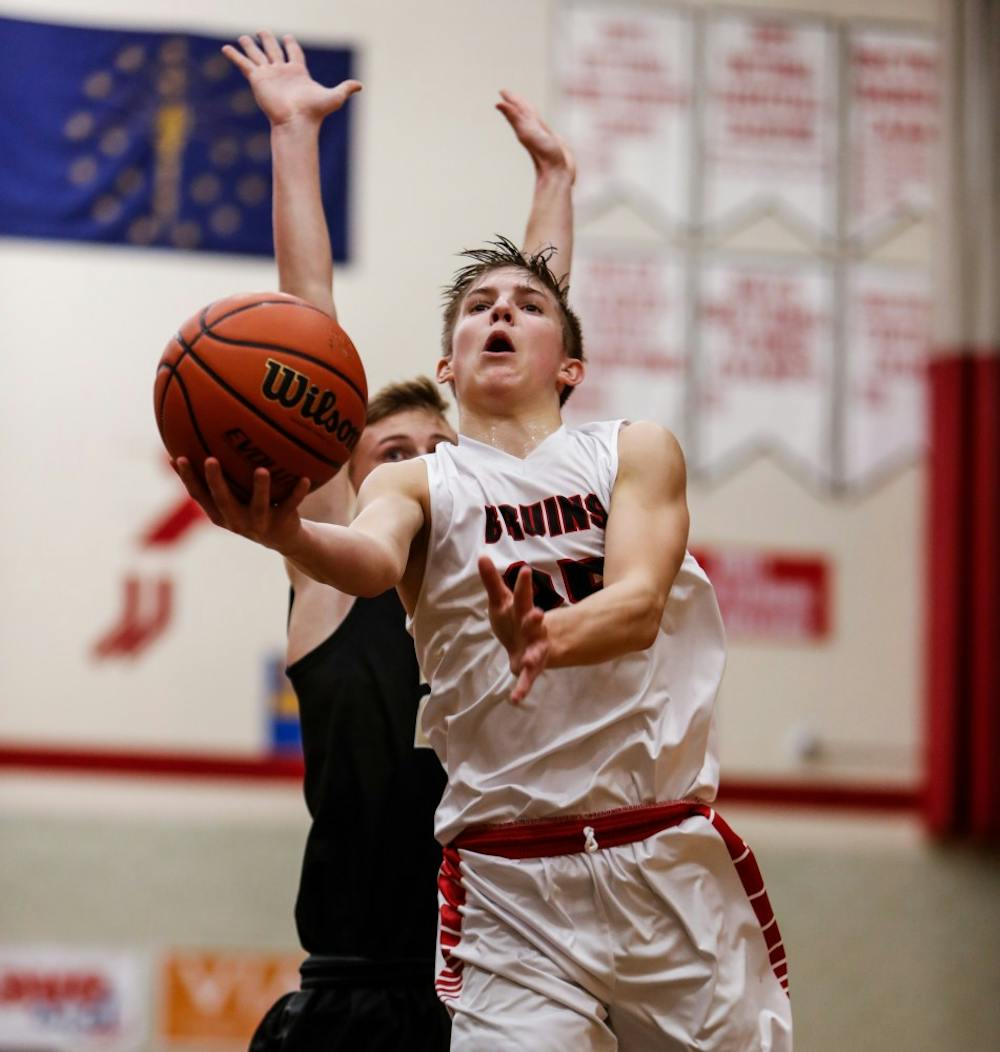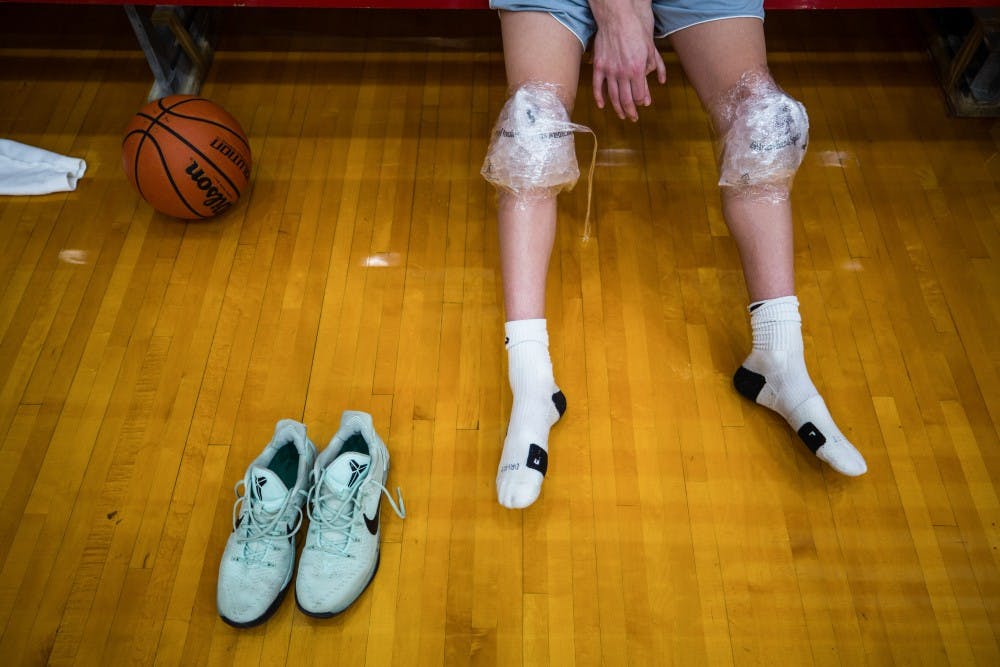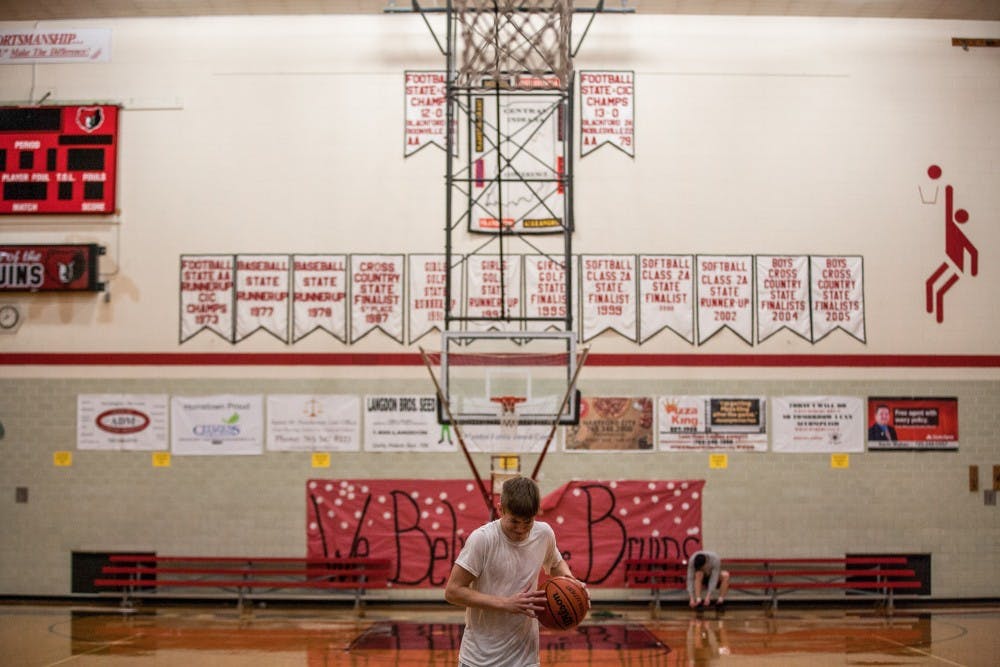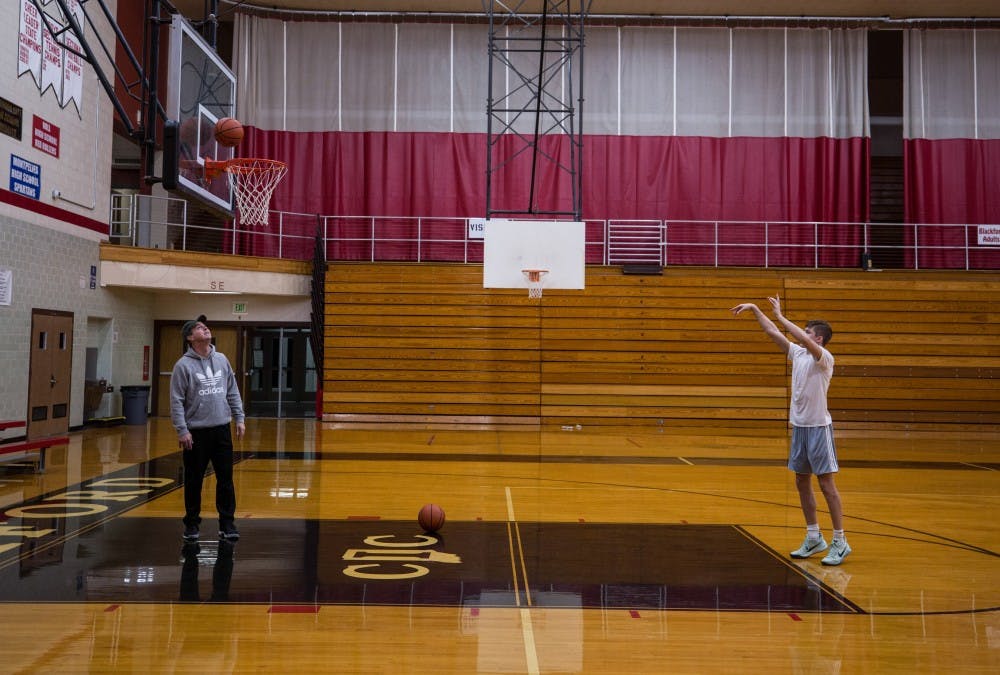HARTFORD CITY, Ind. — The kid’s name reverberates throughout the gym.
Luke Brown, the freshman point guard, remains stoic through the pregame rituals. His face, so smooth and innocent it’s as if he just escaped from sixth grade, shows only concentration as he nails each practice shot from behind the arc. His knees are killing him, but he ignores the pain.
The old man who brought Luke to this small town and to this unlikely moment in its history stands a few feet away, motionless by the bench. At 83, Jerry Hoover is hard of hearing, but he knows how much it would mean to the home crowd for Blackford High to win tonight. Like Luke, he knows better than to let his thoughts stray from tonight’s matchup.
Coach Hoover and Luke, 16, came to Blackford together. A package deal, brought in to end the lingering misery of one the worst losing streaks in state history. Now, on this Friday night in January, the team is 8-1 heading into this game against Winchester Community High School.
Hoover wants Luke to take his time, but when the moment comes, to take it.
“Keep attacking,” he keeps telling him. “Put it on them.”
On the first possession, Luke pushes up the court and heads inside toward the hoop, a Winchester guard shadowing him. Suddenly Luke stops, takes a step back behind the 3-point line to get free and shoots.
As the freshman backpedals away, his eyes follow the ball arcing. The coach tracks it too.
In years past, it was anyone’s guess if a shot would go in. Now it seems preordained.
***

For a long, long time, the Blackford High Bruins forgot how to win. Then the old man and the boy showed up. Something about the duo — youth and talent guided by decades of experience — has sparked a resurrection that almost defies description.
“Surreal,” Luke’s mom called it.
Before Jerry Hoover and Luke Brown arrived in Hartford City, the Bruins had won one game in three seasons. They had a 61-game losing streak that lasted from February 2014 to January 2017 — nearly an Indiana state record. The last time the team had a winning season, 16 years ago, its current upperclassmen were toddlers.
Hartford City was enduring its own stretch of struggles too. Industry left. Jobs disappeared. More than a quarter of the town’s population vanished.
Then last summer, Hoover called the high school with a proposition.
“Hey, this is crazy,” he told Blackford High’s athletics director. “I’m an old man, and all I want you to do is hear me out.”
The next morning Hoover was in Tony Uggen’s office offering to be the Bruins’ next head coach.
The applicant was beyond qualified. He’d spent his life on a basketball court. As a 6-foot-6 walk-on, he’d played at Purdue in the 1950s and then gone into coaching high school. He had a history of turning around struggling programs and a gift for developing talent.
At Ben Davis High, he coached Randy Wittman before Wittman helped IU win a national championship in 1981. At Logansport High, he’d coached Whitney Jennings — recognized as Indiana’s top female high school basketball player in 2014 — and led the team to a regional championship. But now he was in his 80s, and his white hair was thinning. He wanted to get back on the sideline, he told Uggen, but said the schools where he interviewed kept turning him away because of his age.
“I don’t hunt, I don’t fish, I don’t play cards, and I don’t play golf,” Hoover said. “I coach basketball."
And he wouldn’t come to Blackford High alone. He wanted his son Don, a former college basketball player, to serve as an assistant coach and take over if anything happened health-wise. Don’s son J.D.— Hoover's grandson — would play his senior season for the Bruins. Luke, a distant relative, would move from Brownsburg with his family.
The pitch sounded too good to be true.
“What am I missing?” Uggen remembered thinking. “So we started making some calls, and I’ll be honest I had no idea who Jerry Hoover was. I feel stupid now, because as soon as he walked out I Googled him, and he pops up everywhere.”
The package deal was built on three generations of Hoovers and Browns playing high school basketball together. Hoover and Luke’s grandfather, a prolific scorer who could knock down long-range shots just like Luke, were best friends and first cousins when they played together. Don played with Luke’s dad, Ted. And now Luke is playing for Hoover alongside J.D.
As Hoover puts it, Blackford was a good fit.
“Square peg, square hole,” he said. “Round peg, round hole."
When Hoover and his point guard showed up at the gym that fall, the team’s mindset transformed almost immediately. Luke played with a confidence that was contagious. Hoover preached fundamentals. That November, for the first time in more than a decade, the Bruins won their season opener. Then they won their second game. And their third. By January they were already closing on Hoover’s goal of 12 wins.
The old man and the kid hesitate to overanalyze why the two of them work so well together. But the chemistry is undeniable.
Luke responds well to Hoover’s even-keeled personality, and the coach’s respect for his point guard is obvious.
“He’s just an All-American young man,” Hoover said.

On defense, the freshman stays in front of his man but avoids committing reckless fouls. Averaging nearly 30 points a game, he’s third in the state in scoring behind two seniors — including Robert Phinisee, who will play for IU next year.
Luke can hit shots from nearly anywhere on the floor, even half court. He can weave through a thicket of defenders on his way to the basket for a layup, pull up for a mid-range jumper and dish the ball to open teammates if the defense collapses on him. His spontaneous creativity is already drawing comparisons to NBA Hall of Fame guard Pete Maravich.
Through it all, Luke’s coach towers by the bench, analyzing what’s unfolding, radiating calm. Everything about the man says he knows what he’s doing.
***
Only a few seconds remain in the second quarter against Winchester. Luke has already scored 10 points, including the 3-pointer in the opening seconds, but it’s not enough. Blackford trails 27-23.
On the sideline, Coach Hoover looks into Luke’s face.
“We need a bucket,” he tells the kid. “Go get it.”
The faithful watch his every move. His dad is sitting up high, in the second to last row. Ted Brown chooses a different spot each night so his son doesn’t know where to look for him.
Knowing there’s almost no time, Luke catches the inbound pass and hurries up the court. He blows past a lone defender and lets his shot fly a little past half court. The buzzer sounds while the ball is in mid-air, sailing straight for the net. As the Bruins head into the locker room at the break, Luke’s heave has pulled them within one.
In the second half, the Blackford defense is lackadaisical and can’t stop Winchester. They’re scoring from inside and outside, and at the foul line they almost never miss. Up in the stands, Luke’s dad shakes his head.
“We better figure out some magic,” Ted says.
Winchester’s lead is never in doubt, but the home crowd’s support never wavers. By game’s end Luke has scored 31 points, but it’s not enough. Winchester wins 67-60, and for the first time since the package deal, Blackford High loses at home.
Luke sits in the trainer’s room after the game with ice on his knees.
“We were trying to not lose at home all season,” Luke says. He’s disappointed, but not crushed.
When Coach Hoover walks into the locker room after the game, he doesn’t give a rousing Hollywood-style speech. He thinks talking to a team after a game is unproductive because he hasn’t watched the film yet.
“I love the effort,” he tells his players. “Come back Monday and we’ll talk about it.”
The loss doesn’t faze him, or Luke, or the rest of the team. So much of the season remains, and they’ve already come so far.

***
Back in 1970, when the first class of students graduated from Blackford High, the school had close to 1,200 kids. Hartford City’s population was 8,207.
“This was the place to be in the '70s,” Tony Uggen said. The Bruins won nine sectional titles from 1970-84.
But companies started to leave town, which touched off a population exodus. The basketball team’s struggles at times paralleled the demise, and some families even sent their kids to other high schools for the chance to play for a winning team.
Today, Hartford City’s population is estimated at 5,920, and the high school only has about 550 students. The Bruins haven’t won a sectional in nearly three decades.
Uggen felt embarrassed last year when the school recognized its new Hall of Fame class during a basketball game in front of a couple hundred, at best. The basketball team's recent revival has crowds larger now than they’ve been in years.
Blackford High’s athletic department has a bigger budget now, too. Uggen estimates the school made more money through the first nine games of this season than it did all last year when the team went 1-22. That means $4,000 for new glass backboards to replace wooden ones that have been there for nearly 50 years. The gym will get a new paint job over the summer, too, and Uggen plans to replace the banners that hang on the gym’s walls. Even the football team is getting new shoulder pads and helmets.
Hoover told Uggen the basketball team didn’t need new uniforms. He’s more concerned with building the pipeline of talent.
“We don’t want it to be just, ‘Hey Luke’s here, everything’s great,’ then in 2021 he graduates, and poof we go right back to where we were before,” Uggen said.
Blackford wasn’t a wasteland of talent before the Hoovers and Browns arrived. But certain pieces were missing. The coach brought one of those pieces with him — a point guard — but the team still needs height. So now Hoover visits local elementary schools and the junior high at lunchtime, roaming the cafeterias to recruit.
“I make no bones about it, I'm looking for tall boys." Hoover said. “If I can find a tall boy I talk to him, see if he’s playing basketball, and if he isn’t, I try to encourage him to do it.”
Luke grew up watching Hoover coach. He admits he was intimidated when he first met the coach, but now he’s soaking up what Hoover is teaching him. The coach, meanwhile, knew early on Luke was talented. But until they came to Blackford, the depth of that talent wasn’t clear.
When Luke wrote down his goals in fourth grade, one was to play Division I basketball. Even though he’s only a freshman, Ball State and Indiana State have already expressed interest. A framed note from Purdue assistant coach Steve Lutz hangs in Luke’s bedroom.
The pain in his knees should be gone by the time he graduates. He suffers from Osgood-Schlatter disease, which won’t be resolved until he’s done growing.
Don Hoover, the coach’s son and assistant coach, also works in physical therapy at Western Michigan University.
“If you’ve ever had someone hit you with a hammer in the testicles, that's how it feels," Don said. “It’s a joyous occasion. Two years from now he’ll be fine.”

Rest might be the best course of action for managing the pain, but Luke doesn’t want to sit. Most mornings, he wakes before dawn and heads for the school gym to work on his shot. Hoover wasn’t a fan of these early morning workouts when Luke started them. But he changed his tune after his point guard didn’t come in early to practice one morning and shot poorly at a game that night.
Luke knows the value of extra work. So does his coach.
During the day, when his players are in class, Hoover preps for upcoming games, watching film in the training room for eight to 10 hours at a stretch. If the old man gets tired, he falls asleep on a nearby couch. Sometimes, when he wakes, he can’t find his keys. So the freshman searches the couch’s crevices and finds his keys for him.
***

Before dawn last Friday morning, Luke walks, favoring his left knee, into the school with his dad. A game against Eastbrook High is scheduled for that night.
A lone janitor waxes the hallways. School won’t start for another hour and a half.
Luke enters the dimly lit gym and turns on the lights himself. He sheds his sweatshirt and sweatpants and changes his sneakers. He’s now in a T-shirt and shorts.
“Do you need anything from me right now?” his dad asks.
“Can you rebound for me?” Luke replies.
Luke starts practicing free throws. He can tell if a shot is going in or not.
“That’s off,” he says to himself “Come on.”

Outside, the sun starts to rise. Luke rotates around the basket inside the arc, then steps behind the 3-point line and reverses direction. Each make means he can move to a different spot. Each miss means he stays there until he finds his mark.
“Looking good,” his dad says.
Luke grits his teeth, sticks out his tongue. His face scrunches with intensity.
“And this is a calm morning,” Ted says.
Luke returns to the free-throw line to finish his workout.
“I just want to make this last one,” he tells his dad. He knocks down the shot, walks over to the bleachers behind the basket and sits down. His dad comes over with a couple bags of ice and wraps one around each knee. Luke will walk around with them on all day.
That night, in another win, he scores 42 points.

A previous version of a photo caption in this story had misspelled the name of Jerry Hoover. Another photo caption referred to Blackford High School as Blackburn. The photo captions have since been updated. The IDS regrets this error.




![Dean_Reingold_ltr[52] (1).jpg](https://snworksceo.imgix.net/ids/25483b05-dabd-4378-92bd-70a32c2579f0.sized-1000x1000.jpg?w=1500&ar=16%3A9&fit=crop&crop=faces&facepad=3&auto=format)